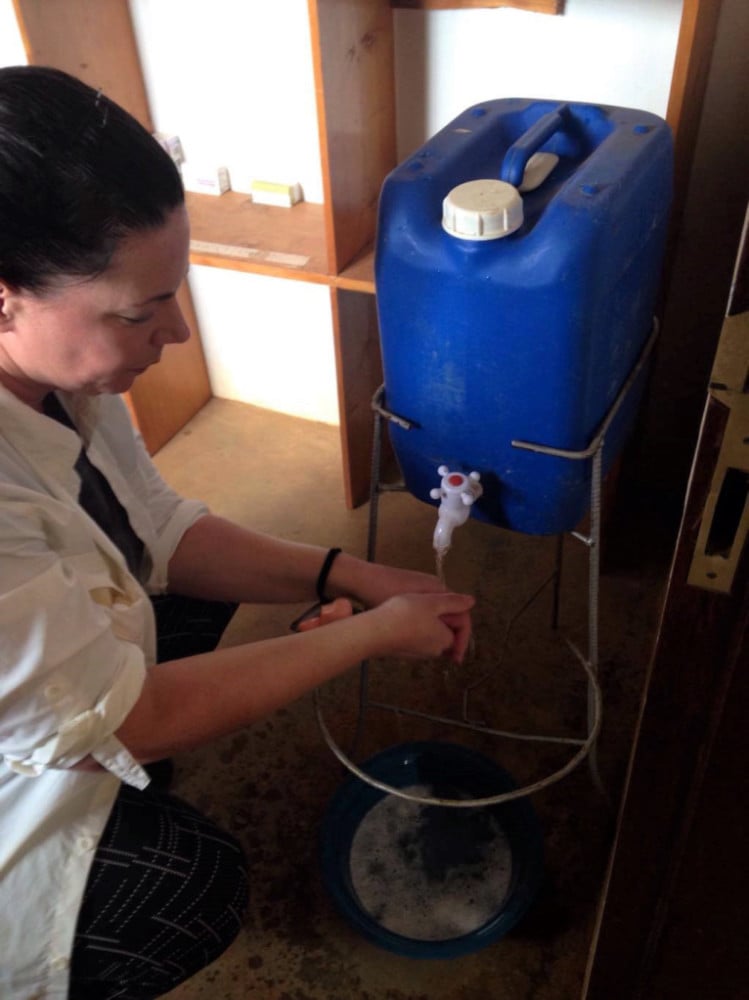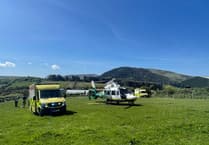Julie Blackburn talks to nurse, Rian Gale, who travelled to Uganda with the aim of using her skills to help people. What happened there is a cautionary tale as Rian has come home, not only with a badly injured leg, but also angry and slightly disillusioned.
It was a long-held dream of Rian’s to volunteer somewhere where her nursing skills could really make a difference. She took leave from work and used her own money, topped up by several months of fundraising, to pay for the trip.
The clinic she would be working in was near Fort Portal, a 13-hour drive from Kampala, and she made the journey with Alex, another volunteer nurse, from the USA.
Right from the start, Rian was rocked back on her heels by the complete lack of so many basic facilities and good practice that we take for granted in our health service here. The first shock was that a project to collect rainwater to provide clean water for washing and drinking at the clinic had stalled and the clinic had no running water, as she explains:
’What they had was water in jerry cans. I went to get a little girl some water to drink and there was mosquito larvae in the water and mould at the bottom - it wasn’t safe drinking water.
’We wanted to keep ourselves and our patients safe from infections but if you can’t wash your hands what are you supposed to do?’
Rian badly wanted to help and had money with her that could be used to help the water situation: she talked to the sister who appeared to be in charge of the day to day running of the clinic and was met was a decidedly negative response.
She was well aware of the sensibilties as she says:
’I didn’t want to be a white person that just walked in and said: "I’m gonna save the day".’
This was only the beginning of Rian’s frustration as she saw so much that needed to be done - and she knew possessed the skills to make a difference - but the lack of any infrastructure to allow efficient treatment of patients, along with a lack of basic medical knowledge, made it impossible.
On the first day she was there a boy of around eight was admitted who was suffering an asthma attack. They gave him an anti-inflammatory drug by intramuscular injection. Rian was horrified: ’We would never do that because it’s very sore and you shouldn’t give anti-inflammatory drugs to asthmatics anyway. He was screaming - poor little boy. It was horrible.’
She borrowed a copy of the official Uganda guide on medical practice, which nurses and doctors there appeared to follow . Despite being date ’2015’, it contained such bizarre statements as ’only women carry HIV’.
She also discovered that the clinic’s only doctor wasn’t really a doctor at all. Rian, whose qualifications include a BSc Hons in Health and Social Care and a Masters level qualification in Mentoring and Assessing, says:
’He was more like a paramedic and, to be honest, I was more qualified than him.’
On another day a truck pulled up and some men brought in a ’bundle of blankets’ which contained a women who they took straight into a ward and laid on a bed with no thought to the possibility of exposing the other patients any infection she might be carrying.
Rian recalls: ’She was emaciated and malnourished and she wasn’t breathing: when we rolled her on her side we could hear her lungs crackling. I asked if there was any suction and there wasn’t and no airways so there was nothing for an emergency. There were no gloves in the room and only an empty box in the clinic room.’
Rian had to go and get some gloves which she had brought with her and managed to clean the woman’s airway as best she could using her fingers so that she started to breathe a little more easily but the lack of any suitable facilties had shaken her:
’I actually thought that woman was going to die because we couldn’t even do the first step of what we would do here which is to start an airway.
’I knew what to do and I knew I could help this lady if I had the right stuff.’
Rian’s frustration only grew when she subsequently discovered 10,000 pairs of gloves and some suction equipment in a store room which the sister had apparently not been aware of.
It’s impossible to know how Rian would have fared if she had stayed for the six weeks she had planned because a week later, on her first day off, she suffered a serious leg injury. She and Alex and two other girls had gone to Fort Portal and had a swim and a meal at a big hotel there.
’I just turned around and I dislocated my knee and, as I did that, I fell. I’ve had a dislocated knee before so I put my knee back in and thought I’d got away with it. Then I went to stand up and as I did I saw the bone in my foot press into my skin. I’d completely broken it when I fell so it was hanging on by the skin. I grabbed my foot with both hands and I did not let go.’
Rian was then faced with the terrifying prospect of trying to find treatment in a place where she knew they didn’t have the expertise needed.
She recalls: ’The doctors were on strike so there was no point in going to the hospital. We had to try and find a clinic that had an x-ray machine.’
There was nowhere available till the following day and she was given a tiny tube of pain relief gel whilst Alex improvised a splint from cardboard. The next day they drove around again, this time for a couple of hours, to find a clinic with Rian trying to hold her foot together. The x-ray confimed what the pain and swelling had already told her: this was a bad injury and she would need to fly home to get it treated properly.
After a nightmare journey she arrived in London where she underwent a six-hour operation in an NHS hospital before flying back to the island. Her leg has been pinned and plated and she is likely to need further surgery on her knee. She has started going to the Hyperbaric Chamber to nhelp the healing process.
And she says she is very angry, not just because she had felt completely unable to use her nursing skills to the full whilst working in Uganda, but because of a shocking discovery she made after she returned.
There had been an outbreak of the fatal Marburg virus in the country which the charity organising her trip had apparently known about before she went out there and they had not informed her about it.
Rian says: ’I committed myself to a certain degree of risk and I was willing to accept that but I am furious they made the decision that the Marburg risk was low enough for me to go when it was my decision to make.
’I wouldn’t recommend anyone going to Uganda now.’
’My foot was hanging on by the skin. I grabbed it with both hands and I did not let go.’

.jpeg?width=209&height=140&crop=209:145,smart&quality=75)
.png?width=209&height=140&crop=209:145,smart&quality=75)


Comments
This article has no comments yet. Be the first to leave a comment.